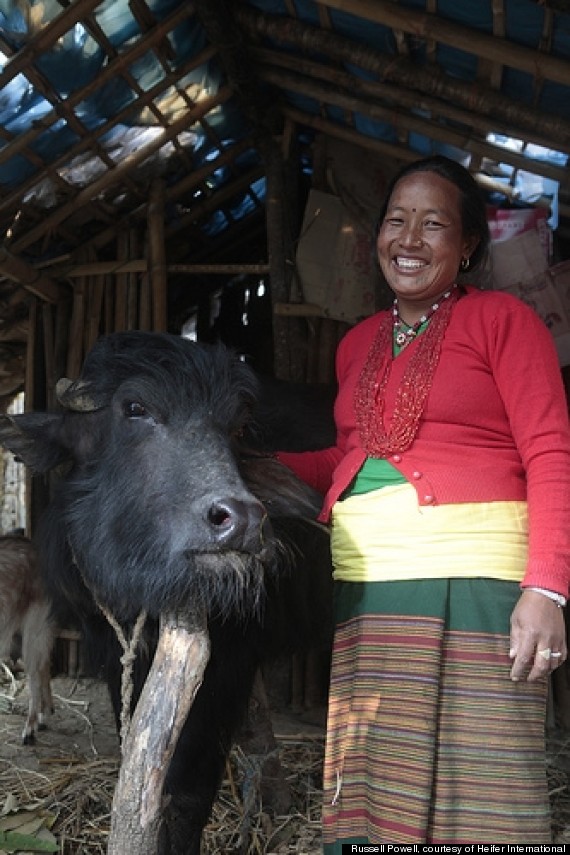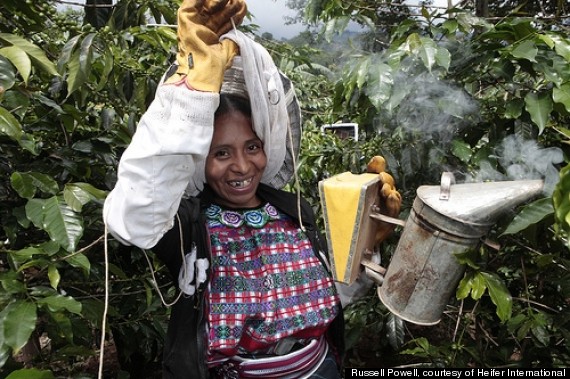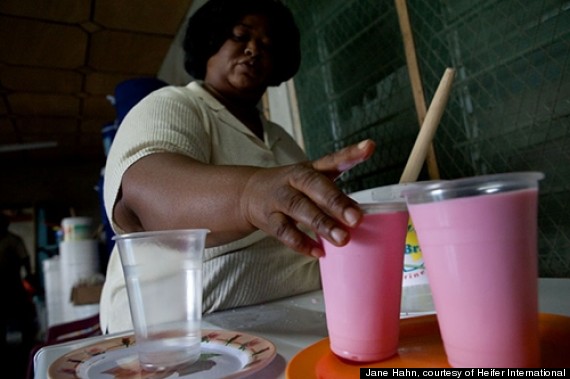Most people in the international development sector will tell you: there is no development strategy more beneficial to society than one that involves women as central players. And without sufficient investment in women farmers, we will fail to feed the world's booming population, reversing gains made through the Millennium Development Goals.
We simply cannot afford to leave women farmers behind.
Gender equity, where women and men are valued equally and enjoy the same opportunities to fulfill their potential, is a basic human right and an important component of international development work. When gender equity is present, we find accountability, efficiency and sustainability.
Former Secretary of State Hillary Clinton said in an interview with Heifer International's World Ark staff, "Women have shown, time and again, that they will seize opportunities to improve their own and their families' lives. And even when it seems that no opportunity exists, they still find a way."

Bhim Kumari Lama with her water buffalo in Juretthum village, Nepal.
Our mission at Heifer International is to work alongside women and men, providing animals and training, and educating them to use these gifts as assets to build businesses. As families grow better, more resilient crops, their nutrition and diets improve, and they earn more income.
Women make up 43 percent of the agricultural labor force worldwide. They are the very backbone of agriculture, the key drivers of food production. They own less than 1 percent of the earth's land, but they produce up to a staggering 80 percent of the developing world's food - proof that, as authors Nicholas Kristof and Sheryl WuDunn observe, "Women hold up half the sky." In this case, more.
We see progress around us. Extreme poverty has already been halved, and getting rates close to zero is a reality within our grasp. A dozen or more countries have reached the first Millennium Development Goal to halve hunger from 1990 levels.
But tell that to a mother who cannot grow or afford enough to feed her children.
Public and private investments in research, irrigation and infrastructure are up, and the Green Revolution continues. Yields are up, for example, in Malawi, which transformed itself from a net importer to a net exporter of maize for a number of years running. We've seen improvements in Rwanda, Kenya, Ghana and elsewhere.
But there remains much to be done; we cannot afford to lose the momentum. Women still face significant disparity in the resources and support they can access, including land, credit and education.
This is not acceptable.
Development is not just about offering the opportunity of a livelihood and access to basic social services; it's about creating an environment where people can realize their rights, achieve self-reliance and participate meaningfully in society.

Feliciana Martin prepares to work on one of her beehives in Tuiboch village, Guatemala.
For Heifer, it begins in a farmer's field, but it has to grow - to bloom, so to speak - so that women take their place and strengthen their impact in decision-making forums, such as local cooperatives, national agribusiness forums, government cabinets and others.
History shows that economic and social development always contributes to positive attitudinal changes and perceptions regarding the role of women, proving that given the right tools, along with the opportunity to build assets and income and a means to broaden the views of men to accept women's rights, these women will help lead and help feed the world.
Take Joyce Ayiku of Ghana, for example.
Ayiku, or "Mama Yogurt" as she was dubbed, received a dairy cow from Heifer International five years ago. What she discovered was that there was little to no market for the excess milk from the cows (prior to 2007 in Ghana, dairy products made with actual milk - rather than powdered milk - were hard to come by). She soon began processing the extra milk into yogurt, and Heifer connected her with marketing professionals. She now can't make enough yogurt to keep up with the demand, even with the extra milk that the other 34 dairy farmers in her group sell to her.

Mama Yogurt serves up samples.
Joy Natural Yogurt comes in many flavors and is sold at supermarkets, schools and churches in her area. She makes her own labels with the help of her son, who is in college thanks to the money she's made.
And she's not done. She envisions her own Joy Natural Yogurt plant, as well as a stand-alone shop.
Challenging societal barriers to equality and equity - traditional gender roles, caste systems - has been part of many of our projects. In fact, in the majority of our projects, the livestock is given directly to the women, many of whom have never owned property in their lives.
Before traveling to India last year to visit some of our projects, I received the following video to prepare me for the impact I would witness in the field.
Pierre Preview from Maggie Carroll on Vimeo.
It's worth repeating: The world's women farmers, most of whom lack access to sufficient land, credit and education, already grow the majority of the food eaten in the developing world.
Just imagine what they will do when gender equity is realized - when men support them and we invest heavily in them. We will see a world where no child dies from poverty and hunger.
This post is part of a series produced by The Huffington Post and the NGO alliance InterAction around the United Nations General Assembly's 68th session and its general debate on the Millennium Development Goals (MDGs), "Post-2015 Development Agenda: Setting the Stage" (September 24-October 2, 2013). The session will feature world leaders discussing progress made on the MDGs and what should replace them when they expire in 2015. To read all the posts in the series, click here; to follow the conversation on Twitter, find the hashtag #No1Behind. For more information about InterAction, click here.
